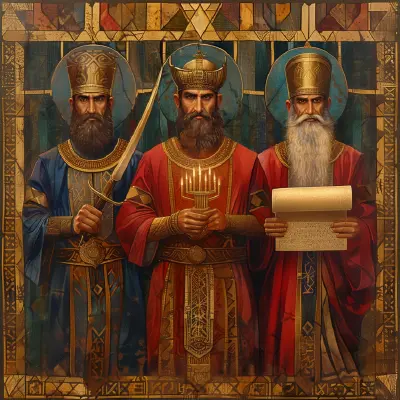“What Caesar wants, Caesar gets”. Famous words that would change history forever in 66 CE.
Since the start of Roman intervention (and then later rule) in Judea there’s been a sense of unfinished business so to speak. The culture shocks that have been happening over the last 200 years still have not fully resolved themselves. Those events that had taken the form of violence against some communities, rejection of the authority of the Sanhedrin, rejection of foreign goods, culture and ways of doing things, and a general inward turning culture has been forced open by the presence of Rome.
The great Republic and now Empire still defining itself, the role of Caesar and what it means to be ruled by Rome is itself in the midst of culture shocks. Recovering from the civil wars of first Caesar and Pompey, and later Octavian and Antony and Cleopatra; Rome is trying to figure out how the Senate and a succession of Caesars can share power (or at least pretend to).
Herod the Great who first backed Antony in the failed civil war hopes that a huge bribe and successive acts of contrition to Octavian (the new Caesar and now, Augustus) will save both his skin and his kingdom from the ravaging of the legions that had scoured Gaul and shattered the Carthaginians and Egyptians. His plan pays off; but Herod continues a policy of peacefully embracing Rome to keep the legions at bay. Building temples, baths, raising statues, embracing Roman art, even naming cities after Caesar. These are all attempts to show Rome Judea can be a peaceful part of the still forming Empire. No legions are needed here.
Herod’s embracing of Roman culture, and later the light presence of direct Roman authority wasn’t helping ease those unresolved issues. Judea itself was still recovering from generations of civil wars. Unresolved social issues, the generational trauma of having your city destroyed, or forced conversion to the Jewish religion are still in recent living memory. On top of all this, living the pure life, or the way God intended still hasn’t finished defining itself to the satisfaction of several thousands of the population.
The generational trauma, the sense that no one is following the laws of God, the insanity of allowing a foreign power to rule a country that had so recently won its independence from another power rival to Rome; these are things driving a feeling that the end is neigh. That the world should come to an end. Messianic figures come out of the countryside. No less that two Jesus’ and one Egyptian all show up with thousands of disciples to claim the mantle of Christos and free the people. Rome crushes them all.
After that famous fire of Rome in 64 CE Nero takes a personal interest in the fabulously wealthy Judea. Personally appointing a friend of the family as the new governor, Gessius Florus has only one job, extract wealth in order to pay for the rebuilding of Rome. What Nero wants, Nero gets and no less than two years later the first Jewish Roman war begins in the form of a Jewish revolt led in part by a man named Yosef, but who history remembers better as Flavius Josephus.
Hosted on Acast. See acast.com/privacy for more information.
